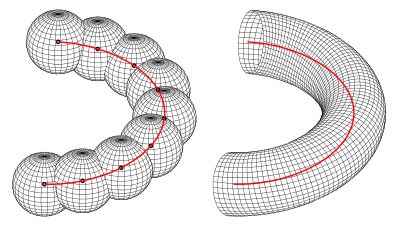Channel surface



A channel or canal surface is a surface formed as the envelope of a family of spheres whose centers lie on a space curve, its directrix. If the radii of the generating spheres are constant the canal surface is called pipe surface. Simple examples are:
- right circular cylinder (pipe surface, directrix is a line, the axis of the cylinder)
- torus (pipe surface, directrix is a circle),
- right circular cone (canal surface, directrix is a line (the axis), radii of the spheres not constant),
- surface of revolution (canal surface, directrix is a line),
Canal surfaces play an essential role in descriptive geometry, because in case of an orthographic projection its contour curve can be drawn as the envelope of circles.
- In technical area canal surfaces can be used for blending surfaces smoothly.
Envelope of a pencil of implicit surfaces
Given the pencil of implicit surfaces
![\Phi_c: f({\mathbf x},c)=0 , c\in [c_1,c_2]](../I/m/ec430b28f53b8feb1385613a27cc478c.png) .
.
Two neighboring surfaces  and
and
 intersect in a curve that fulfills the equations
intersect in a curve that fulfills the equations
 and
and  .
.
For the limit  one gets
one gets
 .
The last equation is the reason for the following definition
.
The last equation is the reason for the following definition
- Let be
![\Phi_c: f({\mathbf x},c)=0 , c\in [c_1,c_2]](../I/m/ec430b28f53b8feb1385613a27cc478c.png) a 1-parameter pencil of regular implicit
a 1-parameter pencil of regular implicit  - surfaces (
- surfaces ( is at least twice continuously differentiable). The surface defined by the two equations
is at least twice continuously differentiable). The surface defined by the two equations
is the envelope of the given pencil of surfaces.[1]
Canal surface
Let be  a regular space curve and
a regular space curve and  a
a  -function with
-function with  and
and  . The last condition means that the curvature of the curve is less than that of the corresponding sphere.
. The last condition means that the curvature of the curve is less than that of the corresponding sphere.
The envelope of the 1-parameter pencil of spheres
is called canal surface and  its directrix. If the radii are constant, it is called pipe surface.
its directrix. If the radii are constant, it is called pipe surface.
Parametric representation of a canal surface
The envelope condition
 ,
,
of the canal surface above is for any value of  the equation of a plane, which is orthogonal to the tangent
the equation of a plane, which is orthogonal to the tangent
 of the directrix . Hence the envelope is a collection of circles.
This property is the key for a parametric representation of the canal surface. The center of the circle (for parameter
of the directrix . Hence the envelope is a collection of circles.
This property is the key for a parametric representation of the canal surface. The center of the circle (for parameter  ) has the distance
) has the distance
 (s. condition above)
from the center of the corresponding sphere and its radius is
(s. condition above)
from the center of the corresponding sphere and its radius is  . Hence
. Hence
where the vectors  and the tangenten vector
and the tangenten vector  form a orthonormal basis, is a parametric representation of the canal surface.[2]
form a orthonormal basis, is a parametric representation of the canal surface.[2]
For  one gets the parametric representation of a pipe surface:
one gets the parametric representation of a pipe surface:


Examples
- a) The first picture shows a canal surface with
- the helix
![(\cos(u),\sin(u), 0.25u), u\in[0,4]](../I/m/48b803fb1093577471b22c761eacda97.png) as directrix and
as directrix and - the radius function
 .
. - The choice for
 is the following:
is the following:
 .
.
- the helix
- b) For the second picture the radius is constant:
 , i. e. the canal surface is a pipe surface.
, i. e. the canal surface is a pipe surface. - c) For the 3. picture the pipe surface b) has parameter
![u\in[0,7.5]](../I/m/b41827b5c61feaa80478192045c1f038.png) .
. - d) The 4. picture shows a pipe knot. Its directrix is a curve on a torus
- e) The 5. picture shows a Dupin cyclide (canal surface).
References
- ↑ Geometry and Algorithms for COMPUTER AIDED DESIGN, p. 115
- ↑ Geometry and Algorithms for COMPUTER AIDED DESIGN, p. 117
- Hilbert, David; Cohn-Vossen, Stephan (1952). Geometry and the Imagination (2nd ed.). Chelsea. p. 219. ISBN 0-8284-1087-9.



